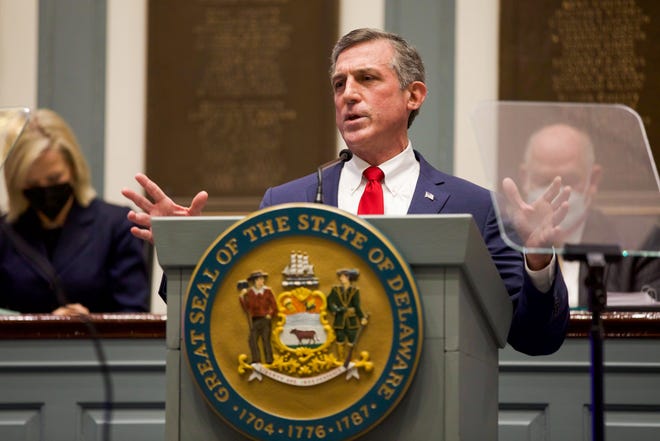After years of failed attempts, the General Assembly has passed a bill to legalize the possession of up to 1 ounce of marijuana, clearing the path to potentially establish a recreational weed industry in Delaware.
But first, it sets up a possible conflict between the governor and lawmakers.
The bill, which was passed by the state Senate on Thursday, now makes its way to Gov. John Carney’s desk – where its fate is unknown.
The governor has been strongly against the legalization of recreational marijuana, putting him at odds with his party. Carney has called this effort a “bad idea” and has been unwavering in his position.
Since the General Assembly is in session, he has 10 days to veto this legislation. If he does, it would then return to the General Assembly, where it would need to receive a three-fifths majority vote in both chambers.
This legislation can likely meet this threshold: Both chambers passed the bill with this support. If Carney doesn’t reverse course on his position, this could be his most controversial veto as governor.
Historically, it has been rare for the Delaware General Assembly to override a governor’s veto: The last successful override was in 1977, according to state historians.
DELAWARE WATCHDOG:Based on medical marijuana, Delaware may not be ready to oversee recreational industry
Lawmakers, in recent decades, have made almost no attempts to do so. The last vote to even attempt one was in 1990.
Will Gov. Carney support legal weed?
A spokeswoman for the governor said Carney will review the bill and that his position hasn’t changed.
“The governor has expressed some concerns with this issue generally, and the reality for us as legislators is that we have to make these decisions in a little bit of a tumultuous set-up here,” said Sen. Kyle Evans Gay, D-Talleyville, on the Senate floor.
“What I would ask and what I hope is that if and when this bill passes today,” she added, “that the legislature and the governor’s office will work together to ensure that the setup is what our constituents are asking, which is legalization in a safe, regulatory market.”

If it does become law, Delaware would join 18 other states that have already legalized marijuana.
There currently is no criminal penalty for possessing 1 ounce or less of marijuana, since it has been decriminalized in Delaware for years. Now, with this legislation, there would be no civil penalty. There would also be no criminal or civil penalty to the transferring of weed between two people older than 21 in most cases.
But for anyone under 21 or those possessing more than 1 ounce, this would still remain as an unclassified misdemeanor. Public consumption also remains illegal.
BACKSTORY:Delaware House passes bill to legalize possession of marijuana in historic vote
Here’s what’s next for marijuana legalization in Delaware
The next challenge for the General Assembly is to pass legislation to regulate a recreational marijuana industry in Delaware, which would allow for the growing and selling of weed.
Lawmakers decided to split the bills up in two earlier this spring since some members said they would only vote to regulate marijuana if it was already legalized.
The regulation bill, which has yet to be voted on in either chamber, requires a three-fifths vote among lawmakers. This is a threshold the legislature has consistently failed to meet.
Though the legalization bill saw some Republican support in the House, it didn’t see any in the Senate on Thursday.
Sen. Colin Bonini, a Republican from Dover, reiterated the views of other Republicans, that this bill would lead to unintended consequences. He expressed concern that this bill would legalize marijuana without regulation ever happening.
“We might as well call this ‘encourage illegal behavior act,’” Bonini said. “Because where are you going to get it? A drug dealer.”
When Bonini ran for governor in 2016, he had expressed support for marijuana legalization – a point raised on Thursday by Sen. Trey Paradee, who is a sponsor of the legalization bill.
Paradee said he shared Bonini’s concerns about the General Assembly legalizing marijuana and then failing to pass the regulatory bill.
If the regulatory bill, HB 372, does not pass by the end of session on June 30, Paradee said he would personally ask Carney to veto the bill.
Contact Meredith Newman at (302) 256-2466 or at mnewman@delawareonline.com. Follow her on Twitter at @MereNewman.